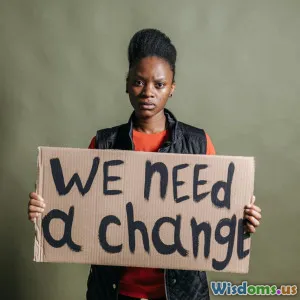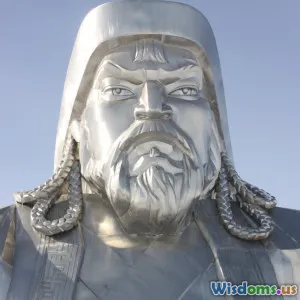
Leaders in the Fight for Freedom
9 min read Explore the stories of iconic leaders who shaped the global fight for freedom and justice throughout history. (0 Reviews)
Leaders in the Fight for Freedom: History's Greatest Figures
Freedom has been the driving force behind some of the most pivotal moments in human history. The quest for liberation—from tyranny, oppression, and injustice—has inspired remarkable leaders who stood against the odds to change the world. This article delves into some of the most influential figures in the fight for freedom, exploring their ideologies, battles, and legacies that continue to resonate today.
The Power of Freedom: A Universal Aspiration
Throughout centuries, freedom has symbolized more than just an abstract ideal; it embodies the fundamental human right to self-determination, dignity, and justice. Philosophers like John Locke framed freedom as a natural right essential to human existence, while modern political movements embrace it as the cornerstone of democratic societies.
However, freedom has often been denied to many due to forces such as colonization, slavery, authoritarianism, and systemic discrimination. Against these challenges, leaders emerged worldwide, crystallizing collective aspirations into movements for change.
Mahatma Gandhi: Nonviolence as a Weapon for Freedom
One cannot discuss leaders in the fight for freedom without highlighting Mahatma Gandhi. Born in 1869 in India, Gandhi pioneered the philosophy of Satyagraha—a method of nonviolent resistance—transforming the Indian independence movement.
-
Philosophical Foundation: Gandhi’s deep commitment to nonviolence (ahimsa) was rooted in spiritual and ethical convictions, inspired by Hinduism, Jainism, and Christian teachings.
-
Historical Impact: Leading mass civil disobedience campaigns like the Salt March in 1930, Gandhi galvanized millions to defy British colonial rule peacefully. His tactics not only undermined colonial authority but also captured global attention, illustrating the strength of moral resolve against military might.
-
Legacy: Gandhi’s model inspired other leaders such as Martin Luther King Jr. and Nelson Mandela, emphasizing that freedom can be pursued through principled resistance rather than violence.
As Gandhi famously said, “You may never know what results come from your actions, but if you do nothing, there will be no results.”
Nelson Mandela: A Journey from Prison to Presidency
Nelson Mandela’s life story is a profound testament to resilience and forgiveness in the quest for freedom. Born in South Africa's apartheid era in 1918, Mandela spent 27 years imprisoned for opposing the racially segregated regime.
-
Struggle Against Apartheid: Mandela co-founded the African National Congress's (ANC) armed wing, initially endorsing militant resistance against oppressive laws that segregated and disenfranchised Black South Africans.
-
Imprisonment and Moral Authority: His long imprisonment on Robben Island turned Mandela into a symbol of suffering under oppression internationally.
-
Transition to Democracy: Upon release in 1990, Mandela became pivotal in negotiating an end to apartheid, culminating in South Africa’s first multiracial elections in 1994.
-
Presidency and Reconciliation: As the first Black president, Mandela promoted reconciliation over retribution, emphasizing nation-building, healing, and equality. His 1996 Truth and Reconciliation Commission remains a powerful approach for post-conflict societies.
Mandela’s reflection, “I have walked that long road to freedom. I have tried not to falter; I have made missteps along the way. But I have discovered the secret that after climbing a great hill, one only finds that there are many more hills to climb,” encapsulates the ongoing journey toward freedom.
Harriet Tubman: The Moses of Her People
In the United States, Harriet Tubman stands among the most courageous figures in the fight against slavery and injustice. Born into slavery circa 1822, she escaped but risked her life repeatedly to lead others to freedom via the Underground Railroad.
-
Escape and Rescue Missions: Tubman undertook approximately 13 missions that freed over 70 enslaved people, using secret routes and safe houses. Her bravery in navigating hostile territory amazed allies and terrified slaveholders.
-
Civil War Contributions: During the American Civil War, Tubman worked as a nurse, cook, and spy for the Union Army. Notably, she guided the Combahee River Raid, directly leading to the liberation of over 700 slaves.
-
Legacy of Empowerment: Harriet Tubman symbolizes the fight for freedom intertwined with women's leadership and African American heritage. Her name now graces landmarks and the future $20 bill, honoring her heroic impact.
Toussaint Louverture: The Visionary of Haitian Independence
Toussaint Louverture transformed an enslaved population into the architects of the world’s first Black republic and the second independent nation in the Americas after the United States.
-
Background: Born into slavery in Saint-Domingue (now Haiti) around 1743, Louverture was a strategic military and political leader.
-
Revolutionary Leadership: He masterminded the Haitian Revolution (1791–1804), utilizing guerrilla tactics and diplomatic acumen to defeat French, Spanish, and British forces.
-
Legacy: Though eventually captured and deported by the French, Louverture’s vision laid the foundation for Haiti’s 1804 declaration of independence—the first successful slave revolt establishing a sovereign state.
-
Quote: “I was born a slave, but I will not die one,” reflects his unwavering commitment to liberation.
Louverture's struggle challenged the global norms of slavery and colonialism, inspiring abolitionist and anti-colonial movements worldwide.
The Collective Spirit: Movements and Modern Implications
While individual heroes capture the imagination, the fight for freedom is often a collective struggle involving grassroots activism, political movements, and societal shifts.
-
Women’s Suffrage Leaders: Figures like Susan B. Anthony and Emmeline Pankhurst mobilized women globally for political enfranchisement, showing the power of organized civil activism.
-
Civil Rights Movement: Inspired by leaders such as Martin Luther King Jr., this era emphasized nonviolent protest to dismantle segregation and legal discrimination.
-
Global Human Rights Advocacy: Today’s fight extends into digital activism and international coalitions pushing for democracy and human rights, exemplified by figures such as Malala Yousafzai advocating girls' education worldwide.
Conclusion: Learning from the Past to Inspire the Future
The leaders explored here reveal a multifaceted fight for freedom that spans nonviolent resistance, armed rebellion, political negotiation, and profound personal sacrifice. Their stories highlight the importance of courage, vision, and resilience in confronting injustice.
Freedom is neither automatic nor guaranteed; it requires ongoing vigilance and action. By studying the lives and strategies of these visionary leaders, contemporary activists and societies can find guidance and inspiration to continue advancing liberty, justice, and human dignity worldwide.
As history shows, even the mightiest chains can be broken by determined souls committed to the cause of freedom.
References:
- Gandhi, M. K. The Story of My Experiments with Truth.
- Mandela, N. Long Walk to Freedom.
- Blight, D. W. Frederick Douglass: Prophet of Freedom.
- Geggus, D. P. Haitian Revolutionary Studies.
- McCauley, L. Harriet Tubman: Myth, Memory, and History.
Empower yourself with history’s lessons and be inspired to support freedom for all.
Rate the Post
User Reviews
Popular Posts




















